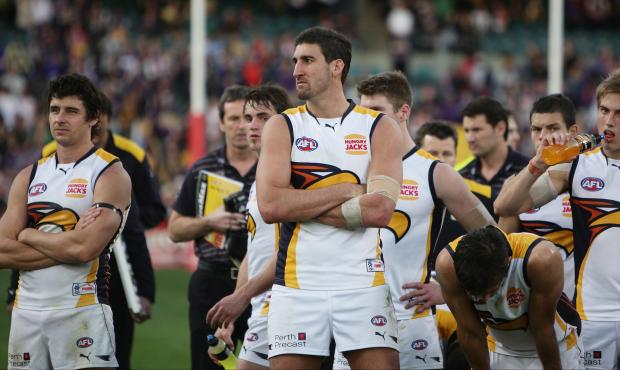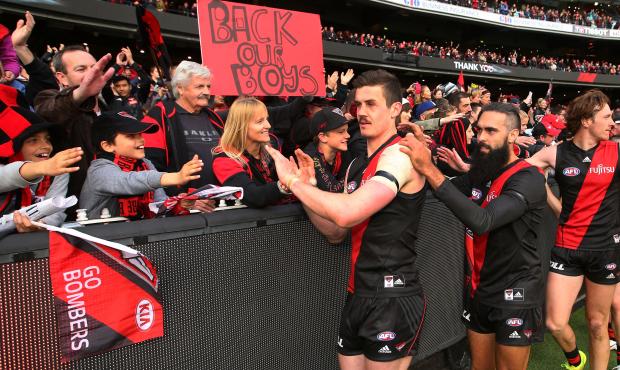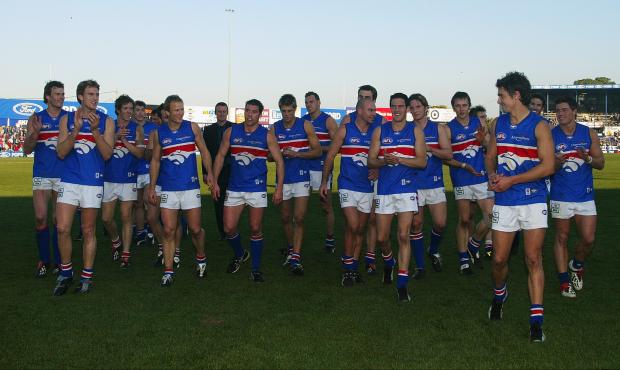In a new weekly series leading up to round one, AFL.com.au writers will debate the best moments, players and teams since the turn of the century. From the pick of the Brownlow and Norm Smith medallists to the finest wooden-spooners, non-finalists and premiership teams, a rotating panel will turn their minds to footy's big moments since 2000.
This week's debate centres around which wooden-spoon team has been the best. Since 2000 the most wins by a wooden-spoon team is four, six times - Richmond 2004, Carlton 2005, Melbourne 2009, West Coast, 2010, St Kilda 2014 and Carlton 2015, the highest percentage by a wooden-spoon team in that time is 77 per cent by Richmond in 2007 and West Coast 2010. A year after West Coast's wooden spoon in 2010 they made a preliminary final.
West Coast, 2010
A measure of any side's character is its ability to bounce back from mediocrity the next year. The 2010 season saw West Coast claim its first wooden spoon in club history. But rather than wallow in despair, the powerhouse club trusted its processes and made it all the way to the preliminary final (finishing fourth) in 2011, only to be beaten by eventual premier Geelong. The Eagles jumped from four wins, with a percentage of 77.1 (the second highest of all teams since 2000) in 2010, to 17 wins, with a percentage of 130.3, in 2011. The absence of captain Darren Glass, who managed just eight games due to a debilitating groin injury, and star midfielder Daniel Kerr, four games due to a long-term hamstring injury, were key factors in the Eagles' slide during 2010. Underlining his importance, Glass was named All Australian in 2011, alongside teammate Dean Cox, while John Worsfold was named coach of the year at the AFL Coaches' Association Awards. Since 2010, West Coast has missed the finals just twice as the club's fresh blood – led by Josh Kennedy, Nic Naitanui and Luke Shuey – have ushered in a new, and successful, era at the Eagles. Everything considered, the 2010 season can be considered a watershed moment in the club's history. - Ben Guthrie
2010 was not a happy year for Dean Cox and the Eagles. Picture: AFL Photos
Essendon, 2016
Can't really argue with that, Benny, especially considering no other wooden-spooner since 2000 has made the leap into finals the next season. Richmond's effort coming from last in '07 to (gulp) ninth a year later is the nearest another side has come. But that could change in 2017. My nomination obviously comes with an asterisk, but the Bombers last year were shaping up as a genuine finals contender before the Court of Arbitration for Sport hit 12 players with anti-doping bans – suspensions which have been fiercely debated since. Despite losing guns like Michael Hurley, Cale Hooker, new skipper Dyson Heppell and Jobe Watson for the entire season, Essendon remarkably still nearly avoided the spoon with a stirring win over arch-rival Carlton in the final round, falling just 0.6 per cent short of the 17th-placed Lions, with both sides on three wins. It was a season like no other, but the exposure for the Dons' youth could be the launching pad for their top-eight assault. - Travis King
The Bombers celebrate their final-round win over Carlton. Picture: AFL Photos
Western Bulldogs, 2003
Win-loss record aside, perhaps the best gauge of a team's performance is its percentage, and that's largely why I've selected the Bulldogs of 2003 as the next-best wooden spooner. Since 2000, no other bottom side has boasted a percentage so superior to that of the second-bottom team. The Dogs' percentage was 74.8, while fellow cellar dweller Carlton's was just 66.7. The problem was the Bulldogs finished with just three wins and a draw – half a game behind the Blues. In their first full season under Peter Rohde, the Bulldogs were generally competitive before the wheels fell off in the last month. Carlton, meanwhile, lost its last 10 games, the last eight by an average of 73 points, including drubbings by margins of 124 and 116 points. By season's end there was little doubt about which team was the worst in the competition. - Ben Collins
Wins were few and far between for the Bulldogs in 2003. Picture: AFL Photos
West Coast, 2010
Trying to mount the case for a fourth 'best wooden spoon team' since 2000 is a wasted exercise. Teams that finish on the bottom of the ladder do so for one overarching reason - they're no good. To prosecute the case for yet another team takes us into the realm of 'alternative facts' and we don't really want to go there given the current climate. So Ben Guthrie has it right. The Eagles of 2010 were pretty good, as far as bottom placed teams go. There were a few mitigating factors on the field and perhaps off it, that contributed to the Eagles having such a stinker of a year. And to this day, when you scan through the list of wooden spooners since 2000, seeing West Coast listed next to 2010, it makes you pause to see whether it is a misprint because by and large, the Eagles have been a very good club. - Ashley Browne


